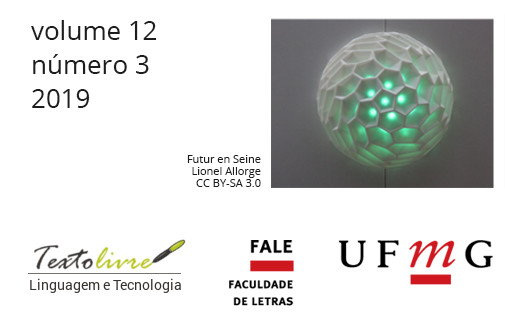Online resources and software for teaching and learning Latin
DOI:
https://doi.org/10.17851/1983-3652.12.3.93-108Palabras clave:
electronic educational resources, online resources, language learning, Latin language.Resumen
ABSTRACT: The aim of this article is to review electronic resources in Latin, analyzing their didactic potential to help Classical teachers to effectively organize the educational process, diversifying the set of tools, and enhancing their work. Today, most of the useful links are accumulated on domestic professional sites devoted to the study of Latin. Many foreign scientists and teachers simply do not know about their existence. From time to time, attempts are made to summarize information and provide content for studying Classic languages in scientific publications, but such information quickly becomes outdated and needs to be regularly updated. This article provides an overview of the current most popular resources on Latin: digital libraries and databases, online courses, electronic textbooks, dictionary, translators etc.; describing the current state of the development of e-learning tools and websites for the study of Latin in Ukraine.
KEYWORDS: electronic educational resources; online resources; language learning; Latin language.
RESUMO: O objetivo do artigo é revisar recursos eletrônicos em Latim, analisando seu potencial didático para ajudar os professores clássicos a organizar efetivamente o processo educacional, diversificando o conjunto de ferramentas e aprimorando o seu trabalho. Hoje, a maioria dos links úteis é acumulada em vários sites domésticos dedicados ao estudo do Latim. Muitos cientistas e professores estrangeiros simplesmente não sabem sobre sua existência. De tempos em tempos, são feitas tentativas de resumir informações e fornecer conteúdo para o estudo de línguas clássicas em publicações científicas, mas essas informações rapidamente ficam desatualizadas e precisam ser atualizadas regularmente. Este artigo fornece uma visão geral dos recursos mais populares da atualidade em Latim: bibliotecas digitais e bancos de dados, cursos online, livros eletrônicos, dicionário, tradutores etc.; descreve o estado atual de desenvolvimento das ferramentas de e-learning e sites para o estudo do Latim na Ucrânia.
PALAVRAS-CHAVE: recursos educacionais eletrônicos; recursos online; aprendizagem de línguas; língua latina.
Descargas
Referencias
BALALAIEVA, O. Yu. Analytical review of electronic resources for the study of Latin. Information Technologies and Learning Tools, v. 40, n. 2, p. 74-82, 2014.
BALALAIEVA, O. Yu. Design of Electronic Textbooks in Latin Language for Higher Agricultural Educational Institutions (PhD thesis). Kyiv: Institute of Information Technology and Learning Tools, 2016.
BALALAIEVA, O. The interface of electronic Latin dictionary for veterinary students. Education Science and Psychology, v. 52, n. 2, p. 26-29, 2019.
DRINGUS, L. P.; COHEN, M. S. An adaptable usability heuristic checklist for online courses. In: FRONTIERS IN EDUCATION CONFERENCE, Oct. 19-22, 2005, Indianapolis, USA. Proceedings… 2005, p. 75. Disponível em: https://ieeexplore.ieee.org/document/1611918/references#references. Acesso em: 15 abr. 2019.
DROZDOVA, D. V. Electronic educational resources for distance support teaching Latin by N. L. Katcman. Distance and virtual education, v. 3, n. 46, p. 4-12, 2011.
HARDWICK, L. Electrifying the canon: the impact of computing on Classical Studies. Computers and the Humanities, Springer Verlag, v. 34, n. 3, p. 279-295, 2000. Disponível em: https://www.jstor.org/stable/30204820?seq=1#page_scan_tab_contents. Acesso em: 12 jan. 2019.
HARRIS, R. Evaluating Internet Research Sources. Virtual Salt, 1997. Disponível em: https://resources.saylor.org/wwwresources/archived/site/wpcontent/uploads/2011/08/HIST104-7.1.2-VirtualSalt.pdf. Acesso em: 01 set. 2019.
HINKE, C. J. Internet resources for the classics. The Classical Outlook, v. 86, n. 2, p. 67- 71, 2009. Disponível em: https://www.jstor.org/stable/43939282?seq=1#page_scan_tab_contents. Acesso em: 11 mai. 2019.
HUNT, F. Teaching and Learning Latin in the Key Stage 3 Classroom: Using the Cambridge Latin Course Explorer Tool. Journal of Classics Teaching, v. 19, p. 42-49, 2018.
KORSAKOVA, E. V. Criteria for selection and principles for the organization of educational material used in foreign language teaching. South Ural State Humanitarian Pedagogical University Bulletin, v. 1, p. 137-145, 2014.
LISTER, B; SMITH, T. Learning Latin by Electronic Media: Edging into the Future. CALICO Journal, v.18, n. 2, p. 235-248, 2001. Disponível em: https://journals.equinoxpub.com/CALICO/article/view/23309. Acesso em: 03 abr. 2019.
LISTER, B. Changing Classics in Schools. Cambridge: Cambridge University, 2007.
MAHONEY, A. Tools for Students in the Perseus Digital Library. CALICO Journal, v. 18, n. 2, p. 269-282, 2001. Disponível em: https://journals.equinoxpub.com/CALICO/article/view/23311. Acesso em: 24 abr. 2019.
MORGAN, J. (ed). Classics & ICT resource course for Europe: a manual for teachers of classical subjects in secondary schools throughout Europe. CIRCE Project, 2006.
PANTELIA, M. Electronic Resources for Classicists: The second generation. New England Classical Journal, Fairfield, v. 22, n. 3, p. 117-126, 1995.
REINHARD, A. Classics Pedagogy in the Twenty-First Century: Technology. Classical World, v. 106, n. 1, p. 121-124, 2012. Disponível em: https://philpapers.org/rec/REICPI. Acesso em: 18 jun. 2019.
Descargas
Publicado
Número
Sección
Licencia
Este es un artículo de acceso abierto que permite su uso, distribución y reproducción sin restricciones en cualquier medio siempre que se cite correctamente el artículo original.











